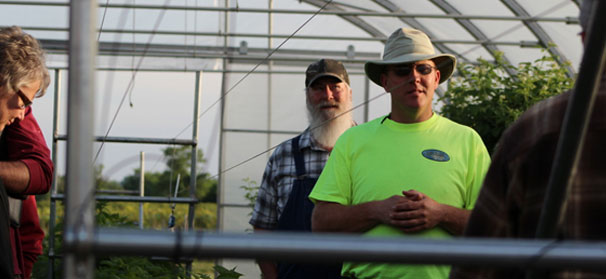

May 21, 2012Knowing best applications for tunnels, greenhouses
When choosing between a high tunnel or a greenhouse, it might be difficult to decide which is a better fit.
That led Andy McNitt, owner of McNitt Growers, Carbondale, Ill., to work with Devin Brown, a program specialist with Foodworks, a sustainable food systems organization, to plan a field day at McNitt’s farm in April.
“I got connected with Foodworks as a way to educate others,” McNitt said. “I’ve found that people often confuse high tunnels and greenhouses. I have several of both and knew I could explain the differences between the two. That is where we started with the field day.”
McNitt has greenhouses from six different manufacturers, and several high tunnels. He has a total of 1.25 acres of greenhouse space and more than 6,000 square feet under tunnels. Currently, he grows red raspberries and a few black raspberries under the tunnels.
“I don’t have a ton of experience with small fruit under the tunnels, but people are often captivated by the raspberries,” he said. “When you see the differences between the berries planted under the tunnels versus those outside, it is really quite dramatic.”
One of the things McNitt sees with the tunnels is that they are quite simple in nature. They are basically just one layer of plastic with sides that roll up, he said.
“They are really for extending the season, and offer some protection in the summer,” he said. “Of course, I’m still learning the best ways to use them. Temperature control is an issue. My tunnel spiked at 130˚ F twice last summer. That’s less than ideal.”
One of the issues McNitt sees with high tunnels is that, quite often, people buy one when they really want it to be more like a greenhouse – so then they start adding components to the tunnel. Growers need to understand what a high tunnel can and can’t do. Tunnels are not designed to be greenhouses, and when growers try to make them greenhouses, failure can be likely. If a grower is looking to extend the season, a high tunnel can offer that. If the grower wants a year-round option but has limits as to what can be grown, a greenhouse is the way to go, he said.
“I’m very rigid about what I’ll put in my high tunnels,” McNitt said. “I also know that they are seasonal. I don’t plan to use them in winter. For that, I have my greenhouses. I’m not putting my raspberries in the greenhouse, but we do well with flowers and strawberries.”
If anything, McNitt would like to make his greenhouses act more like high tunnels. When the greenhouse season is over, the tunnel is still producing. He said he is looking for something to put in the greenhouse to make it productive during the offseason, and for ways to open it up more.
Greenhouses are more enclosed and require a different level of attention, McNitt said. People often shy away from a greenhouse, thinking it will cost too much. Yet if they factor in the expenses of what they are adding to their tunnels, plus the potential for dramatic losses, it can be a better route.
“Most insurance won’t cover a high tunnel because they are designed to be temporary structures,” he said. “You have to take that into consideration when buying one versus building a greenhouse.”
McNitt and Brown welcomed about 30 guests during the field day tour. While they covered the aspects of tunnels versus greenhouses, much of the discussion turned to the plants, McNitt said.
“It’s been impressive so far this season,” he said. “The tremendous amount of sunlight we’ve had so far has really helped both the greenhouse and high tunnel plants.
“The raspberries are way taller this year than last year and the plants have all looked amazing. We were picking strawberries on March 13.”
By Derrek Sigler, Assistant Editor














